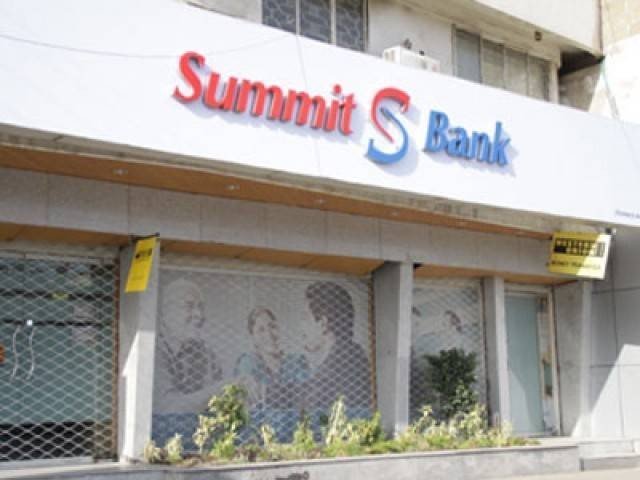KARACHI: Summit Bank submitted an application to the Pakistan Stock Exchange (PSX) on Friday, to request “further issue of shares by way of other than right”. It further disclosed that it has diligently paid off the required Rs 85.3 million to regulatory bodies towards the enhancement of the bank’s paid-up capital on the PSX.
The total amount of Rs 85.3 million comprises two components. Firstly, an Additional Listing Fee of Rs 79.7 million, calculated at 0.2% of the increase in paid-up capital according to PSX Regulation 5.19.1. An additional listing fee is a supplementary charge imposed by a stock exchange when a company decides to augment its paid-up capital or make alterations to its existing listing.
Secondly, a Supervisory Fee of Rs 7.9 million, has been paid to the Securities and Exchange Commission of Pakistan (SECP), which is equivalent to 10% of the Additional Listing Fee paid to PSX. It is worth noting that the bank has accounted for tax deductions amounting to Rs 2.4 million from the aggregate sum, and appropriate evidence of this will be submitted by the bank in due course.
With the regulatory requirements fulfilled and the financial groundwork set, Summit Bank has officially requested the PSX to adjust its paid-up capital by issuing ordinary shares.
Lootah acquire major stakes in Summit Bank
Earlier this year, the bank found itself making headlines as a United Arab Emirates-based investor, Nasser Abdulla Hussain Lootah emerged as its major shareholder.
Lootah injected a substantial amount of Rs 10 billion in January 2023 into the Summit Bank, subscribing to 3.98 billion new shares of the bank at Rs 2.51 per share. Consequently, his ownership stake in the bank increased to a major 51%, solidifying and consolidating his control over the commercial bank’s operations and strategic direction.
Why did Summit Bank need this capital?
The bank was in shambles. In 2018, the bank became the talk of the town owing to its scandals surrounding money laundering. The Federal Investigation Agency (FIA) even conducted investigations into alleged money laundering cases involving Summit Bank and other firms.
In the same year, the bank failed to release its financials prompting raised eyebrows. In 2019, the bank once again failed to release its financials and as a result of this non-compliance, it was downgraded to the defaulters segment of the PSX.
Following the demotion at the stock exchange, the bank made a feeble attempt to correct course by releasing their 2018 financials in 2020, but for a third consecutive year failed to call an Annual General Meeting (AGM).
Then, at the end of 2021, after a lot of pressure from the State Bank of Pakistan to fulfil its regulatory requirements, the bank released three years’ worth of financial statements and the picture was not pretty.
Summit has never been a very profitable bank. In fact, it posted a modest net profit after taxation only twice, in 2014 and 2015, in the past 10 years, that too a small one, Rs 217 and Rs 230 million respectively. In the 2019 results that were released in October 2021, the bank recorded its greatest loss yet, at Rs 9.4 billion. But it wasn’t that far off from the preceding year’s loss of Rs 8.7 billion. It incurred a net loss of Rs 6.9 billion, Rs 2.88 billion and Rs 3.16 billion in 2020, 2021, and 2022 respectively. Consequently, the total accumulated losses on the balance sheet of Summit Bank were Rs 41.7 billion at the end of 2022.
At the end of December 2022, the bank’s paid-up capital stood at negative Rs 21.8 billion as opposed to the statutory requirement of Rs 10 billion. Similarly, its Capital Adequacy Ratio (CAR) stood at negative 79.5% versus the regulatory requirement of 11.5%.
The final nail to the coffin came in last year when the government disclosed that it had committed to International Monetary Fund (IMF) that two banks would be sent into “resolution” by May 2023 if they don’t complete the first stage of their recapitalization plan by March of the same year. If this happens, these banks could be the next to be forcibly restructured or even sold off altogether like KASB Bank was in 2015. While the banks were not named, it is believed that Summit Banks was one of the two banks. Thus, the injection of capital became a crucial necessity for the bank to address its negative paid-up capital and low CAR to avoid resolution.




